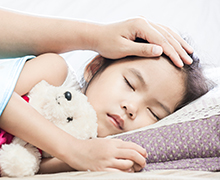Flu Symptoms and Treatment
What are the symptoms of the flu?
 Flu symptoms include fever, cough, sore throat, body aches, headache, chills and fatigue. Some people also have diarrhea and vomiting. Flu symptoms can last as little as one day or longer than a week. It varies from child to child.
Flu symptoms include fever, cough, sore throat, body aches, headache, chills and fatigue. Some people also have diarrhea and vomiting. Flu symptoms can last as little as one day or longer than a week. It varies from child to child.
For help deciding if your child has the flu, visit:
- Seasonal Influenza Symptom Checker and Care Advice
- The Sick Day Guessing Game: Cold or Flu?
- Similarities and Differences Between Flu and COVID-19 (Spanish)
When should I take my child to the doctor or go to the hospital?
Most people with the flu do not require medical care.
If your child has a fever and symptoms such as cough, sore throat, runny nose or a stuffy nose, call their doctor before coming to the hospital. The doctor will decide if your child needs to come to the hospital or not. Also call your child's doctor if your child is under 5 and has flu symptoms.
Visit our symptom checker page to learn more about when to call 911, when to call your doctor and when to treat the flu at home.
What if my child has a chronic health condition and the flu?
Children with chronic health conditions, like heart or lung disease, diabetes, asthma, a neurodevelopmental condition or a neuromuscular disorder can get very sick from the flu. If your child has a chronic health condition and has flu symptoms, call your child's doctor. Your child may need to be tested and treated for the flu. Your child should also get the seasonal flu vaccine. Learn more about flu and children with chronic health conditions.
How do I treat my child's flu at home?
- Make sure that your child drinks plenty of fluids.
- Have your child rest and do quiet activities. Check Activities for Children Sick at Home for ideas.
- If your child is uncomfortable because of a fever, you can give acetaminophen (Tylenol) if your child is over 3 months old. Or, you can give ibuprofen (Motrin) if your child is over 6 months old. Make sure to give the correct dose, based on your child's weight, using the measuring tool that came with the medicine.
- Never give your child aspirin.
- Do not give multiple-symptom cough and cold medicine to children under 6.
- Encourage everyone at home to clean their hands often.
- Keep your child home while they are sick and for at least one day after they no longer have a fever without the use of fever-reducing medicines. Check with your doctor if your child has the flu and close contacts at home are pregnant, are young infants, are elderly, have a suppressed immune system or have a chronic medical condition.
Information updated September 15, 2022